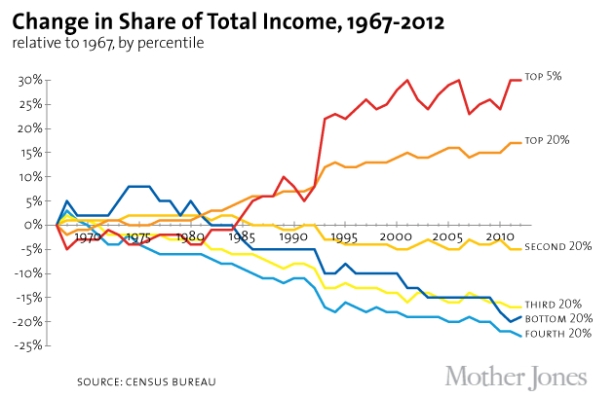‘Tis the season—for inequality
Pope Francis challenged the theory of trickledown economics. Now, President Obama has announced his intention to focus on the problem of inequality.
On my reading, Obama’s speech borrows heavily from the ideas in Jacob Hacker and Paul Pierson’s Winner-Take-All Society and Joseph Stiglitz’s The Price of Inequality. Both the best and the worst parts.
The best parts have to do with the existence and effects of inequality, such as the following paragraphs:
The combined trends of increased inequality and decreasing mobility pose a fundamental threat to the American Dream, our way of life, and what we stand for around the globe. And it is not simply a moral claim that I’m making here. There are practical consequences to rising inequality and reduced mobility. For one thing, these trends are bad for our economy. One study finds that growth is more fragile and recessions are more frequent in countries with greater inequality. And that makes sense. When families have less to spend, that means businesses have fewer customers, and households rack up greater mortgage and credit card debt; meanwhile, concentrated wealth at the top is less likely to result in the kind of broadly based consumer spending that drives our economy, and together with lax regulation, may contribute to risky speculative bubbles.
And rising inequality and declining mobility are also bad for our families and social cohesion — not just because we tend to trust our institutions less, but studies show we actually tend to trust each other less when there’s greater inequality. And greater inequality is associated with less mobility between generations. That means it’s not just temporary; the effects last. It creates a vicious cycle. For example, by the time she turns three years old, a child born into a low-income home hears 30 million fewer words than a child from a well-off family, which means by the time she starts school she’s already behind, and that deficit can compound itself over time.
And finally, rising inequality and declining mobility are bad for our democracy. Ordinary folks can’t write massive campaign checks or hire high-priced lobbyists and lawyers to secure policies that tilt the playing field in their favor at everyone else’s expense. And so people get the bad taste that the system is rigged, and that increases cynicism and polarization, and it decreases the political participation that is a requisite part of our system of self-government.
And the worst? The liberal myth that economic growth, including bringing manufacturing jobs back to the United States, will reverse the longstanding trend of rising inequality.
To begin with, we have to continue to relentlessly push a growth agenda. It may be true that in today’s economy, growth alone does not guarantee higher wages and incomes. We’ve seen that. But what’s also true is we can’t tackle inequality if the economic pie is shrinking or stagnant. The fact is if you’re a progressive and you want to help the middle class and the working poor, you’ve still got to be concerned about competitiveness and productivity and business confidence that spurs private sector investment.
Is this, once again, the theory of trickledown economics, which the pope argues “has never been confirmed by the facts

